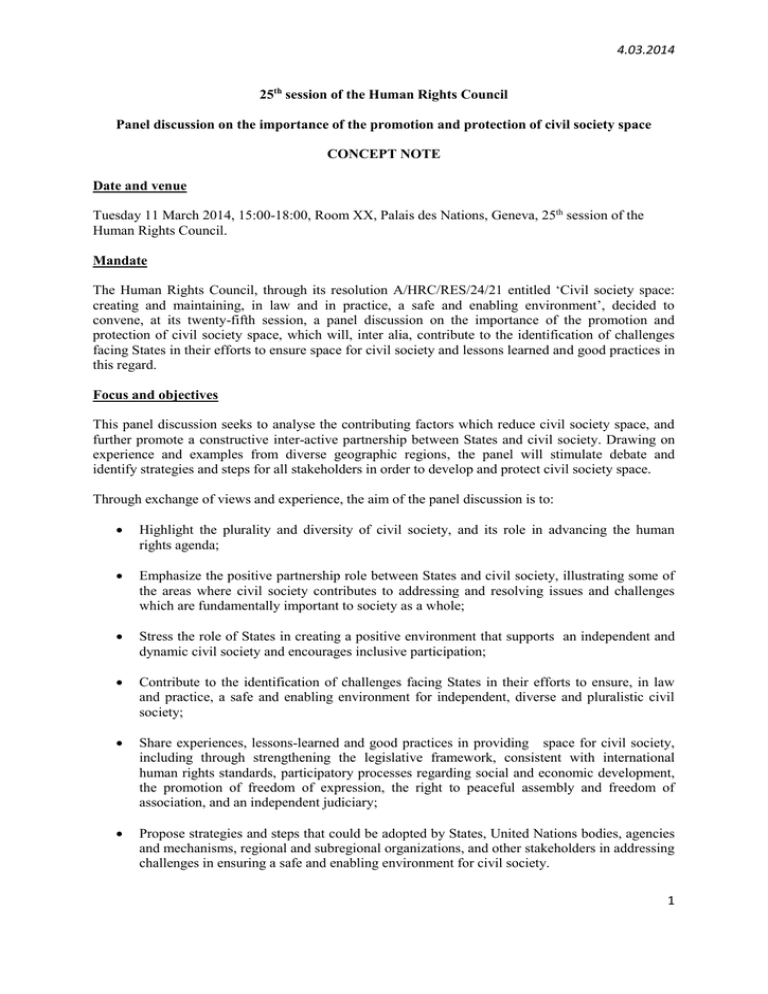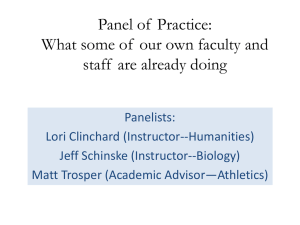4.03.2014 25 session of the Human Rights Council
advertisement

4.03.2014 25th session of the Human Rights Council Panel discussion on the importance of the promotion and protection of civil society space CONCEPT NOTE Date and venue Tuesday 11 March 2014, 15:00-18:00, Room XX, Palais des Nations, Geneva, 25th session of the Human Rights Council. Mandate The Human Rights Council, through its resolution A/HRC/RES/24/21 entitled ‘Civil society space: creating and maintaining, in law and in practice, a safe and enabling environment’, decided to convene, at its twenty-fifth session, a panel discussion on the importance of the promotion and protection of civil society space, which will, inter alia, contribute to the identification of challenges facing States in their efforts to ensure space for civil society and lessons learned and good practices in this regard. Focus and objectives This panel discussion seeks to analyse the contributing factors which reduce civil society space, and further promote a constructive inter-active partnership between States and civil society. Drawing on experience and examples from diverse geographic regions, the panel will stimulate debate and identify strategies and steps for all stakeholders in order to develop and protect civil society space. Through exchange of views and experience, the aim of the panel discussion is to: Highlight the plurality and diversity of civil society, and its role in advancing the human rights agenda; Emphasize the positive partnership role between States and civil society, illustrating some of the areas where civil society contributes to addressing and resolving issues and challenges which are fundamentally important to society as a whole; Stress the role of States in creating a positive environment that supports an independent and dynamic civil society and encourages inclusive participation; Contribute to the identification of challenges facing States in their efforts to ensure, in law and practice, a safe and enabling environment for independent, diverse and pluralistic civil society; Share experiences, lessons-learned and good practices in providing space for civil society, including through strengthening the legislative framework, consistent with international human rights standards, participatory processes regarding social and economic development, the promotion of freedom of expression, the right to peaceful assembly and freedom of association, and an independent judiciary; Propose strategies and steps that could be adopted by States, United Nations bodies, agencies and mechanisms, regional and subregional organizations, and other stakeholders in addressing challenges in ensuring a safe and enabling environment for civil society. 1 4.03.2014 Format Chair: Mr. Baudelaire Ndong Ella, President of the Human Rights Council Video message: Mr. Ban Ki-Moon, Secretary General of the United Nations Opening remarks: Ms. Flavia Pansieri, Deputy High Commissioner for Human Rights Moderator: Ms. Hina Jilani, Prominent human rights lawyer and pro-democracy campaigner Panelists: Ms. Safak Pavey, Member of the Committee on the Rights of Persons with Disabilities; Mr. Frank La Rue, Special Rapporteur on the Promotion and Protection of the Right to Freedom of Opinion and Expression; Ms. Deeyah Khan, film, music and arts producer; Mr. Mokhtar Trifi, Honorary President, Tunisian League for Human Rights. The panel will be chaired by the President of the Human Rights Council. It will begin with a video message by the Secretary General of the United Nations and opening remarks by the Deputy High Commissioner for Human Rights. The panelists are selected to provide gender balance and broad geographic representation, while at the same time ensuring a diverse range of perspectives and experiences. Panelists include UN experts and civil society representatives. The panel will adopt an interactive format. After the opening statement, the panelists will engage in an exchange of views, which will be facilitated by the moderator asking salient questions to the panelists who will be invited to respond based on their respective expertise and experience. Questions will address the following issues, inter alia: What are the factors that contribute to shrinking of the space for civil society? What concrete steps can be taken by States and other concerned stakeholders? How can participatory processes ensure full integration of women, discriminated groups, including minorities, and those living in rural areas? The subsequent interactive discussion will be divided into two segments of 60 minutes each (45 minutes for comments and questions from the floor from States, NHRIs and NGOs, followed by 15 minutes for comments and replies by panelists). States, NHRIs and NGOs are encouraged to formulate their interventions in terms of questions and sharing of experience, in order to stimulate a constructive debate. The interactive discussion will be followed by concluding remarks from the panelists and the moderator. Depending on the number of registered speakers, questions and comments from the floor after the presentation of the panelists may be limited to a maximum of two minutes. States, NHRIs and NGOs are encouraged to intervene in the debate, through questions and comments directly linked to the interventions of the panelists. Accessibility In an effort to render the Human Rights Council more accessible to persons with disabilities and allow them to participate in the work of the Council as fully as possible, this panel will be made accessible 2 4.03.2014 to persons with disabilities. During the debate, international sign language interpretation and captioning will be provided and webcasted. Physical accessibility will be promoted by making room facilities wheelchair friendly. As per established guidelines, braille printing will be available on demand. Outcome The panel will contribute to identification of challenges, lessons learned, good practices, steps and strategies in the promotion and protection of civil society space. A summary report on the panel discussion will be prepared by the High Commissioner and presented to the Human Rights Council at its twenty-seventh session. Background This panel discussion is the first formal discussion in the Human Rights Council on the issue of civil society space as a human rights concern. Civil society work encapsulates the promotion and protection of human rights, embracing countless actors and activities which fulfil and advance the purposes and principles of the United Nations. Civil society space is the environment in which civil society operates. It must be underpinned by a robust legislative and administrative framework, in conformity with international human rights standards and their application, to facilitate freedom of peaceful assembly, association, opinion and expression. Failure to promote and protect civil society space and ensure a safe and enabling environment undermines States’ existing commitments and obligations under international human rights law. States are required to create conditions that actively support the role of a diverse, independent and vibrant civil society and encourage inclusive participation. However, the introduction of legal, administrative and other restrictions in a number of cases has reduced the constructive and complementary partnership role that civil society should play with Governments. Civil society operates at all levels: local, national, regional and international. Whether it is an activist working on environmental conservation, a trade union, a volunteer providing assistance during a humanitarian crisis, a human rights defender contributing to policy formulation, a grassroots organization working to eliminate rural poverty, or a journalist exposing human rights violations, a strong, independent and pluralistic civil society empowers and invigorates communities, contributes to good governance and provides a voice for those who, for whatever reason, are not able to express their views freely or without fear. Most international human rights instruments include provisions which are directly relevant to the protection of public freedoms, and all refer to the principle of non-discrimination. In particular, the Universal Declaration of Human Rights, the International Covenant on Civil and Political Rights provide for the rights to freedom of opinion and expression, peaceful assembly and association, and participation in public life. The International Covenant on Economic, Social and Cultural Rights provides for the right to form or take part (or not take part) in a trade union and to participate in cultural life. The Convention on the Elimination of All Forms of Discrimination against Women provides for the right of women to participate in political, economic and cultural life. The Convention on the Elimination of Racial Discrimination prohibits discrimination in relation to the rights protected under the two Covenants. The Convention on the Rights of Persons with disabilities also guarantees the rights to freedom of opinion and expression, and access to information, participation in political and public life, as well as in cultural life. Other relevant human rights instruments include the Declaration on the Right and Responsibility of Individuals, Groups and Organs of Society to Promote and Protect Universally Recognized Human Rights and Fundamental Freedoms (Declaration on human rights defenders), and the Vienna Declaration and Programme of Action. 3 4.03.2014 The Human Rights Council has adopted a number of resolutions related to safe and enabling environment for civil society actors, including, inter alia, resolutions 12/2 of 1 October 2009, on cooperation with the United Nations, its representatives and mechanisms in the field of human rights, 12/16 of 2 October 2009 on freedom of opinion and expression, 21/16 of 27 September 2012, on the rights to freedom of peaceful assembly and of association, 22/6 of 21 March 2013, on protecting human rights defenders, and 22/10 of 21 March 2013 on the promotion and protection of human rights in the context of peaceful protests. Recommendations to States undergoing the universal periodic review have often included a focus on the State’s relationship with civil society, and its national consultation processes. Independent experts of human rights treaty bodies and special procedures have continued to raise issues related to civil society space in their studies, decisions and recommendations. The United Nations Secretary-General has noted ‘Free and independent civil society is a foundation for healthy, responsive governance. Civil society is crucial for advancing human rights by raising awareness, and ringing the alarm about abuse, inequality, or creeping authoritarianism. Indeed, civil society is central to advancing the work of the United Nations across our agenda, not only for human rights but also for peace and security, as well as development. Civil society has never been more important or needed’. Throughout her mandate, the High Commissioner for Human Rights has advocated for a safe and enabling environment for civil society to be guaranteed at all levels. Strengthening civil society actors, including by creating space for their engagement in the promotion and protection of human rights, has been one of the major achievements of OHCHR in the past twenty years, and will continue to remain in focus in the years to come. 4

